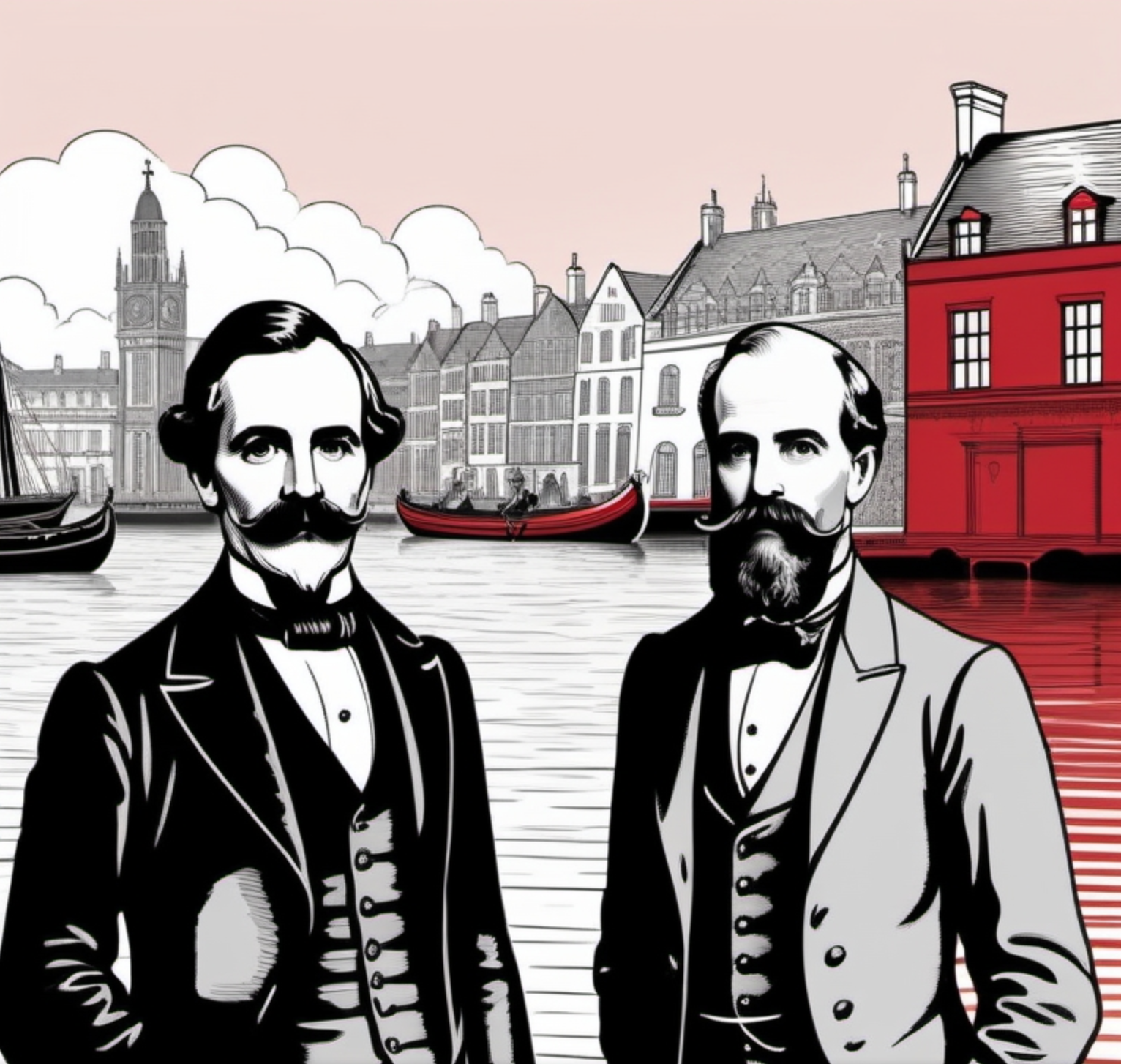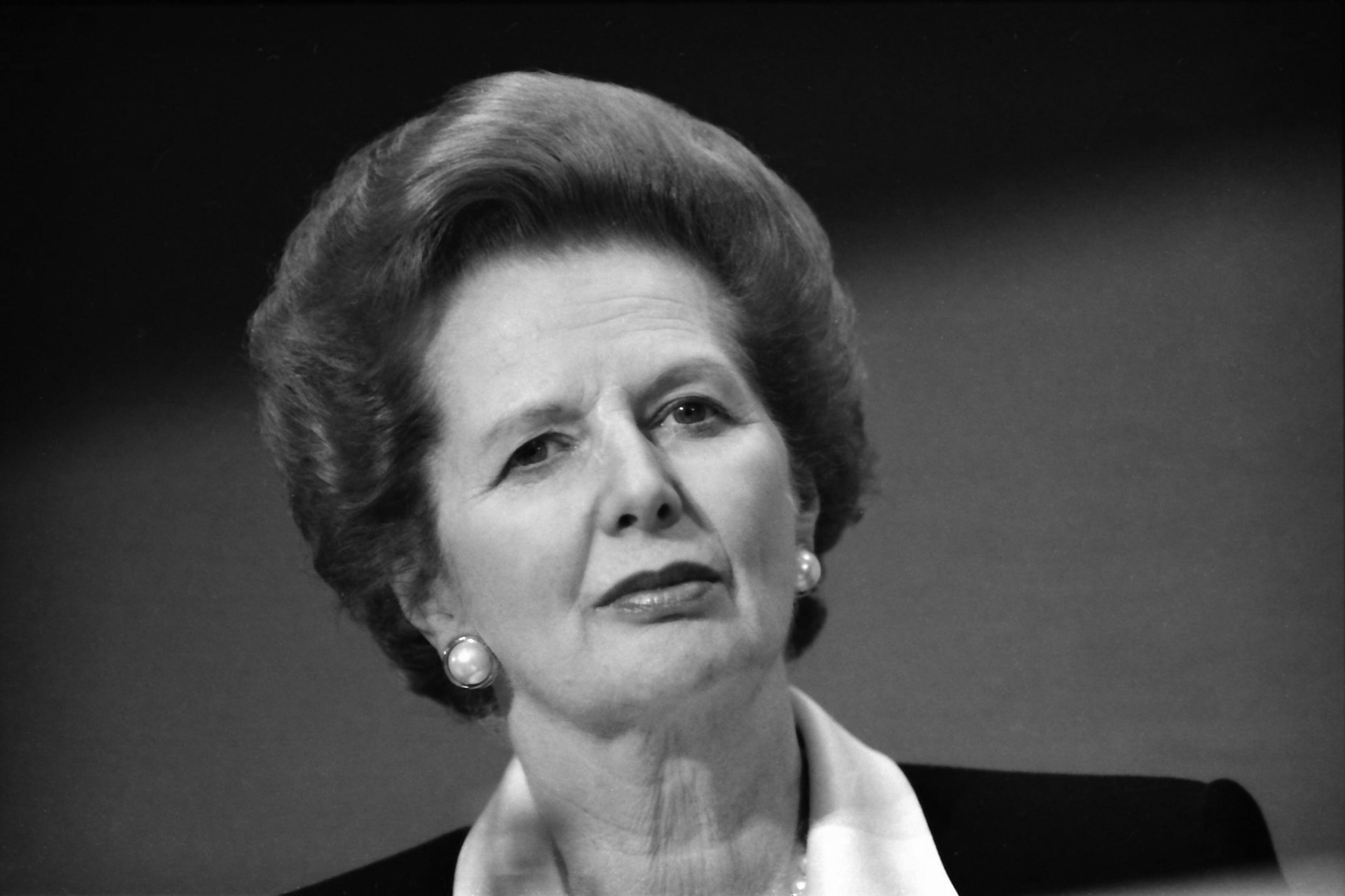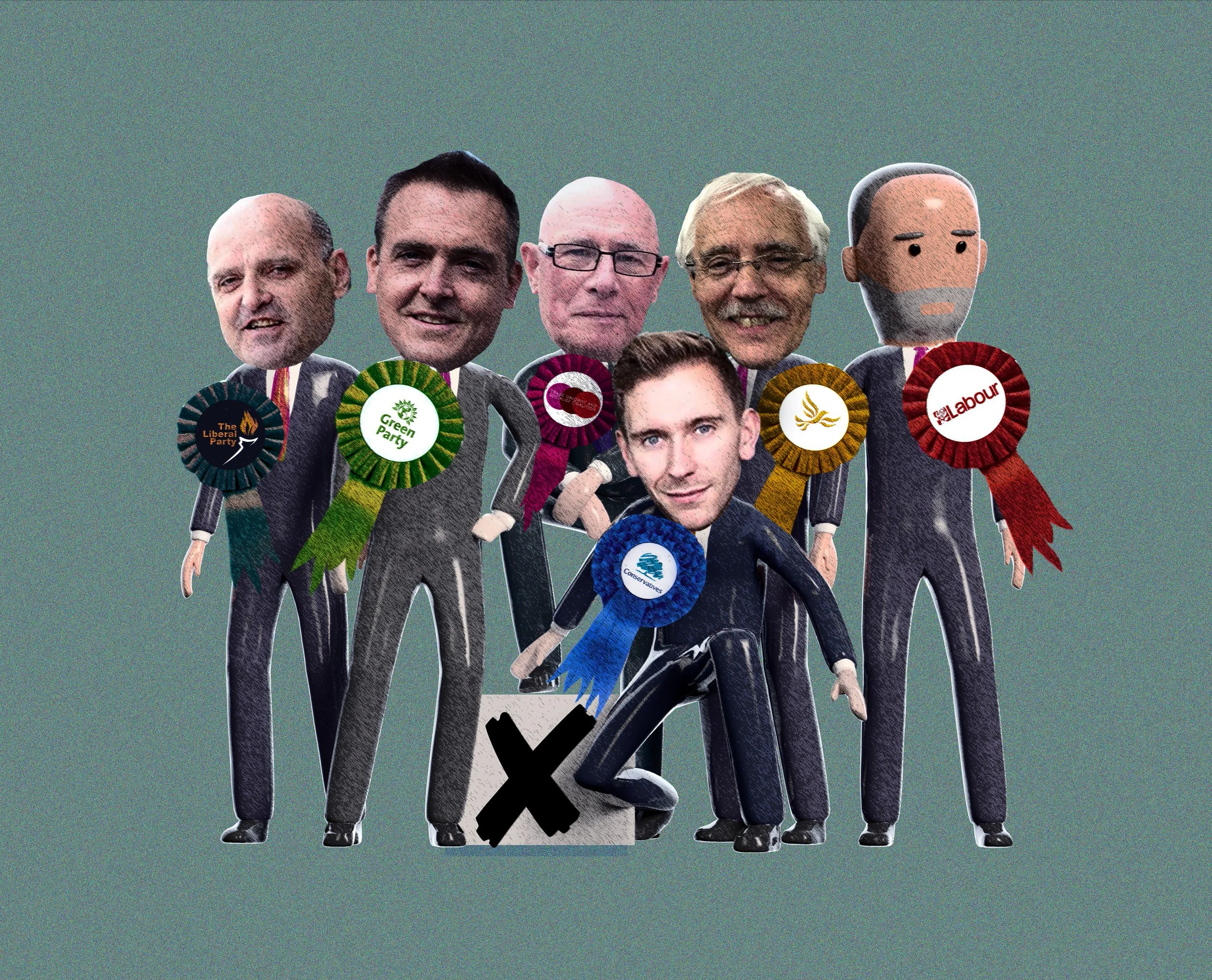Recent features
Referendum or bust – Liverpool’s last chance?
A discredited administration hamstrung by scandal. A weakened leader eyed by pretenders to the throne. A collapse of trust. And, underlying it all, a sense of drift and a loss of status in the world. For Boris Johnson’s Britain read Joanne Anderson's Liverpool. Both increasingly tottering on the precipice.
Liam Fogarty
A discredited administration hamstrung by scandal. A weakened leader eyed by pretenders to the throne. A collapse of trust. And, underlying it all, a sense of drift and a loss of status in the world. For Boris Johnson’s Britain read Joanne Anderson's Liverpool. Both increasingly tottering on the precipice.
Of course, it would be unfair to blame the city's current Mayor for more than a fraction of the woes afflicting Liverpool and its council. But her discarded pledge of a referendum to decide on whether to keep Liverpool's mayoral system was more than just another politician's broken promise. It was an affront to local democracy. The pitifully small response to the council’s subsequent governance consultation – just 3.5% of Liverpool residents replied - was inevitable. Launched in March, and conducted almost entirely online, the process was an artist's impression of a democratic exercise. The letter sent to each city household, directing its recipients to the Liverpool – Our Way Forward website, looked and read like a tax demand. Residents had 3 months to reply but a council taxpayer-funded "Have Your Say" supplement to promote the consultation was published with the Liverpool Echo on June 10th a mere ten days before the submission deadline. Perhaps if they were going to be this half-hearted they shouldn’t have even bothered. Its four vacuous pages contained plenty of room in which to set out the arguments for and against the various governance models on offer. Incredibly, it did not do so. An opportunity for meaningful engagement with Echo readers was spurned in what became a literal waste of space.
So what is to be done?
In his ground-breaking mayoral election campaign last year, as Liverpool absorbed the findings of the Caller Report into council misconduct, Independent candidate and eventual runner-up, Stephen Yip, called for a "re-set" of Liverpool City Council. He demanded top-to-bottom reforms in response to Caller's damning discoveries. The re-set phrase proved popular and was soon taken up by Labour's candidate, Joanne Anderson during her campaign. Once elected, however, she abandoned her commitment to resolve the mayoralty issue by means of a public vote, claiming a consultation would cost less than a full referendum which she deemed too expensive to justify. Since Joanne’s election, we have seen backsliding on the promises of more transparency and scrutiny of council business. Caller’s recommendation for a significant reduction in the number of councillors has been ignored, with the current 90 councillors being reduced merely to 85. Meanwhile, government-appointed commissioners now report that in several respects our council is going “backwards not forwards” in dealing with the issues it faces.
The loss of millions of pounds thanks to a botched energy contract showed systemic failings were not confined to the departments excoriated by Max Caller. There’s talk of more commissioners being drafted in, and more departments falling under their iron fist as skeletons continue to tumble out of closets. Not so much a re-set, then, as a return to politics as usual in Liverpool.
Stephen Yip and I agree that the first step towards an actual re-set is to let the people of Liverpool decide how their city should be led. Liverpool is local democracy’s ‘black hole,’ the only major city in England to have repeatedly denied its residents the chance to vote on how it should be run. The idea that Liverpool's citizens should be able to decide whether to keep or scrap the mayoral system is anathema to the control freaks at the Town Hall. Our politicians won't give us the mayoral referendum we are entitled to unless they are forced to.
Former Independent Mayoral Candidates, Liam Fogarty and Stephen Yip, launch ReSet Liverpool, a campaign to force Liverpool City Council to run a full referendum on city governance.
ReSet Liverpool
That’s why we are launching ReSet Liverpool, a petition-led campaign to give the people of the city the referendum they were promised. We reject the council's attempt to take such a huge decision on the city’s governance by itself. Options for the future running of Liverpool should be put directly to its residents at the ballot box.
Our petition aims to secure the 16,500 signatures (5% of the city's electorate) needed to trigger a referendum on whether Liverpool should retain the post of directly elected Mayor. A referendum held next May to coincide with scheduled elections for a Mayor and local councillors would come at minimal additional cost.
The final say on this issue should belong to the people, not politicians. It’s a matter of principle. Self-serving attempts to sideline the electorate are destructive. They weaken the already-strained connection between the people of Liverpool and their local council and lead to greater cynicism and indifference.
“The final say on this issue should belong to the people, not politicians. Options for the future running of Liverpool should be put directly to its residents at the ballot box.”
Without a referendum, Liverpool’s politicians are likely to revert to type. If they do move to abolish the mayoralty without public consent, then the simmering – and largely unreported - power struggles inside the council’s majority Labour group will burst open, absorbing the time and energies of all those involved. Mayor or no Mayor, in May 2023 every Liverpool council seat will be up for grabs on new electoral boundaries. As what is now 30 wards morphs into a whopping 70 smaller ones, once safe council positions will be under threat as councillors from the same party will be forced to compete with each other. The jockeying to be selected as candidates has already started and local parties’ fratricidal tendencies will be given full rein. The ward elections themselves will provide ideal conditions for the kind of hyper-local political warfare that appeals to party activists but no-one else. The chances of such a process producing a clear city vision, strong civic leadership and a coherent policy platform will be remote. Not for the first time, Liverpool politics will be all tactics and no strategy.
For ReSet Liverpool, a referendum on the mayoralty is the very least the people of this city deserve. May be it can also be the start of a broader campaign to reform our council and renew our city. If you are registered to vote in Liverpool, download a petition form (HERE) and if they live in Liverpool, get your friends, family and neighbours to sign up. Together, we have a chance to help kick-start that overdue process of civic renewal. It could be the last chance we’ll get.
Liam Fogarty is co-founder of ReSet Liverpool. A journalist, broadcaster and lecturer, he ran as an independent in Liverpool’s first Mayoral Election in 2012, finishing second.
Further Information
To find out more about Reset Liverpool and to download a copy of the petition, visit www.resetliverpool.org. Note: Only Liverpool residents over the age of 18 who are registered to vote can sign the petition. Completed petition forms should be returned to:
Reset Liverpool
301 Tea Factory
Fleet Street
Liverpool
L1 4DQ
Share this article
What do you think? Let us know.
Write a letter for our Short Reads section, join the debate via Twitter or Facebook or just drop us a line at team@liverpolitan.co.uk
How should we be governed? Six parties have their say…
The Council’s public consultation on future governance models for Liverpool is now open and at Liverpolitan we think you should get involved. But what’s the position of the parties? We asked six of them – Labour, Liberal Democrats, The Green Party, The Conservatives, The Liberal Party and the Trade Unionist and Socialist Coalition (TUSC) to write up to 400 words stating which of the three governance models they favour and why.
Liverpolitan
Well, we might not have got the referendum we wanted but the people of Liverpool still have a chance to have their say on how the city is run. The Council’s public consultation on future governance models is now open and at Liverpolitan we think you should get involved.
Healthy democracies require participation and in a city that often sets a high bar on shenanigans, figuring out how to keep our representatives and over-lords in check and on-track seems like a worthwhile way to spend our spring evenings.
So what do you need to do?
Visit https://liverpoolourwayforward.com
Read about the three options on the table, weigh up the pros and cons, talk to your friends and family, have a row about it, and complete the online survey by no later than the 20th June 2022.
The three options presented are:
1) The Mayor and Cabinet model – what we have now
2) The Leader and Cabinet model – what we had previously
3) The Committee model – what we had before the year 2000
Once the results of the consultation are in it’s then up to our councillors to decide how or indeed whether to implement the results. That may leave wiggle-room for all kinds of disagreements but there’s a strong suggestion that parties will attempt to honour the outcome. Any changes that take place will be implemented from the 4th May 2023 at the local elections.
But which models do each of the parties support?
We asked six local political parties – Labour, Liberal Democrats, The Green Party, The Conservatives, The Liberal Party and the Trade Unionist and Socialist Coalition (TUSC) to write up to 400 words stating which of the three governance models they favour and why. Each party either has local councillors in Liverpool now or in the case of the Conservatives and TUSC regularly field candidates in local elections.
Here’s what they had to say.
The Labour Party position
We approached Major Joanne Anderson for comment but did not receive a reply, although in a previous interview on BBC Radio Merseyside she said “I want to say neutral." However, an official party spokesperson gave us this statement:
by a Liverpool Party spokesperson
“The city wide consultation is now open and the Labour Party is committed to listening to what the residents of Liverpool have to say about how the City Council is run. It is important that no political party pre-judges the outcome of the consultation and that residents feel that that their voices are being heard. Based on the results of the consultation, the Labour Party will then take a formal position on the governance of our city.”
Model favoured: Undecided
Liverpolitan says: Labour’s position is not to have a position until the results of the consultation are in. They will then decide on their favoured model ‘based on the results’.
The Liberal Democrat position
by Councillor Richard Kemp, Leader, Liverpool Liberal Democrats
The ‘committee system’ is the Lib Dem choice for Liverpool’s governance
“There are three choices allowed in law by which the council can govern itself although some modifications can be made to the Leader and Committee models.
“I am working on the assumption that few in Liverpool would be mad enough to vote to keep the Mayoral system as it has been so badly devalued by Joe Anderson.
“The Leader and Cabinet model has many of the bad mechanisms that are contained in the Mayoral model. Much has been made of the fact that this is the model that the Lib Dems introduced in 2000 but we had little choice because the only two options that were available to us were the Mayoral or Leader models. Both of them concentrate power in the hands of a few people and do so in a way which encourages secrecy and makes it very difficult to challenge what the Cabinet wants to do. The Leader model was the least bad option!
“Since 2012, a third way has been available which is called the Committee system. This means that decisions are taken not by a one-party cabinet but by a number of committees which are representative of the political make-up of the council. That means that:
1. Decisions can be challenged at the time they are made by members of both the biggest party and the other parties on the council.
2. All councillors will be involved in decision making which means that they will know more about what is going on and have to account for the decisions that they make to the people.
3. The people of Liverpool will be more involved as well because there are far more people that they can ‘nobble’ about these decisions.
4. The system is much more accountable and transparent with far fewer decisions being made in the dark recesses of the council.
“We believe that this is the best way forward and will campaign for it in the coming months. However, there is no point in consulting with the people of Liverpool unless we are prepared to debate the issues with them and take heed of what they have to say. We hope that a clear expression of what people want will come out of the consultation. We will then support the people’s views and I challenge the other parties to do exactly the same.”
Model favoured: The Committee system
Liverpolitan says: The Lib Dem’s position is clear – they will be campaigning in favour of a Committee structure of governance but promise to abide by the results of the consultation.
The Green Party position
by Councillor Tom Crone, Leader, Liverpool Green Party
Democratic decision-making for a cooperative political culture
“We are very critical of this consultation. Once again, the people of Liverpool are being denied a proper say on how we are governed. In 2012, while voters in cities across the country were asked if they wanted an elected mayor, Liverpool Labour decided they knew best and imposed the mayoral model. The result was a decade of chaotic mismanagement. Now the city council is having to work round the clock trying to fix the mess left behind.
“This consultation does not have the same democratic authority as a referendum. Having three options makes a clear, unambiguous decision unlikely. The responses will need interpreting, and that will still leave the final decision with the Labour Party. That has a nasty whiff about it. We would much prefer to trust the people of Liverpool with the final decision.
“The Greens will be making the case for adopting the committee system. The committee system involves many more councillors in decision making and policy development. Under the current system even most Labour councillors have very little to do with real decision making. It is only Cabinet members who have real executive powers. Other democratically elected councillors are simply shut out. Even within the Cabinet, the Mayor sets the agenda and can predetermine outcomes. Power is really concentrated in a very small number of individuals. This leads to poor decision making, not least because it fails to make use of the skills and experiences of all the 90 councillors elected to represent their communities.
“The committee system, as well as sharing out power more fairly, also encourages much more constructive cross party working. The public rightly complains about “yah-boo” politics and it is shocking how often our debates in council chamber descend into pointless political point-scoring because really decisions are taken elsewhere. A committee system means different parties having to sit down together and really decide how best to deliver for the people of Liverpool. Councillors will soon realise that they agree on a lot, while learning to respect distinctive perspectives.
“The imposed Mayoral system opened the door to the shame of the Joe Anderson years, and slammed it shut on transparency and democratic accountability. It’s time to ditch the personality politics and let the people back in.”
Model favoured: The Committee model
Liverpolitan says: The Green Party’s position is clear – they will be ‘making the case’ for a Committee structure of governance.
The Conservative Party position
by Dr David Jeffery, Chairman, Liverpool Conservatives
The voters should decide whether we have a Mayor, not Liverpool Labour
“In 2012, referendums were held across 11 of England’s large cities on whether to introduce directly elected mayors. One city was conspicuous by its absence: Liverpool. Instead, in their infinite wisdom, the Labour-run city council decided to ignore the people and voted to bypass a referendum. They introduced the mayoral position by stealth, and parachuted in Joe Anderson – and we all know how that turned out. Of the three authorities which have adopted and then subsequently abolished the mayoral system, all three have done so following a referendum. If Liverpool Labour get their way, once again one city will be conspicuous by its absence: Liverpool.
“The truth is that this Labour council want to ignore voters. This consultation is a gimmick – the result is a foregone conclusion, likely designed to sooth internal party arguments and resentments that have built up under Joe Anderson. We’re told by Labour that a referendum would be too expensive - never mind the fact that seven Labour councillors rebelled over Labour’s budget, which built up excessive financial reserves – but those more sceptical than I might argue it’s not a surprise that this move came after Labour were forced into a humiliating second round of voting in the 2021 mayoral election.
“Decisions on how our city is run should not be made from on high in Labour Party backrooms. Our executive arrangements should not be a consequence of internal Labour Party management. This city’s government is not their plaything, and to treat it as such is an insult to voters.
“There are good arguments for a Mayor: studies have shown that, compared to a council leader, mayors better represent the whole city, are more outward-looking, and are better at bringing much-needed investment into the city. Mayors are put in office by the people, whilst council leaders are selected in grubby back-room deals within their own party, and as such mayors have a better claim to speak for the city as a whole.
“Indeed, it is arguable that the real issues with Liverpool’s politics isn’t the mayoral system, but the fact that Liverpool Labour allowed Joe Anderson to abolish the mayoral scrutiny committee because he didn’t like the type of scrutiny he was receiving.
“Liverpool Labour should do the right thing and give the people of Liverpool a vote on how they are governed. It really is that simple.”
Model favoured: Undecided
Liverpolitan says: The Conservative Party have yet to take a formal position but do see merits in the Mayoral system. However, they believe that it should be up to the voters, not parties to decide which model to choose through the implementation of a referendum.
The Liberal Party position
by Councillor Steve Radford, Leader, The Liberal Party
Time to wake up. Keep the Mayor, adopt Proportional Representation and ask questions
“In over 40 years in politics I’ve seen corruption and abuse of power in all models of local government in Liverpool.
“In the Militant years I saw the sale of land at knock-down prices, council officers withholding information, dodgy minutes and record keeping and much more that I sadly can’t put into print. And that was under the committee system.
“Key to the abuse of council procedures was a willingness by some to turn a blind eye to those who broke or undermined the rules. Later on, during the Lib Dem years things were little different and legal battles had to be fought just to uphold the basic right of council members to attend certain public meetings. That was under the Leader and Cabinet model.
“One of the reasons I fear abuse of power has gone on for so long in Liverpool is the failure of the police to uphold the law. Today, they are tasked with some very important investigations under Operations Aloft and Sheridan that have been triggered during the years of the Mayor and Cabinet model. We should watch the outcome of those investigations closely.
“So what’s the answer? Firstly, we must get rid of the first past the post voting system than gives an inflated majority to a lead party, creating a vacuum of safe seats where the electorate is totally taken for granted.
“Secondly, we need senior council officers selected on merit, not on how subservient they are to the ruling party. Some have been brave enough to stand up for professional standards. Others have not.
“On to the Mayoralty. Without a doubt, both central government and the business community prefer a Mayor with an agenda focused on the whole city, rather than a Leader who is just accountable to a ward and their own political council group.
“Liverpool is an internationally recognised city and we need a Mayor to put us on a level playing field with our global peers. If Liverpool has in the past elected the wrong mayors that responsibility ultimately lies with the electorate. Being candid, it’s about time residents looked more at the person, and less at the colour of the rosette.
“Some readers may know that I chair the City Region Scrutiny Committee – and from that role I can see how the Metro Mayor, Steve Rotheram quietly secures funds for the region by adopting more mature and less confrontational politics.
“We should have a Mayor but we need a more diverse council elected by proportional representation, and we need a more curious electorate willing to ask difficult questions of the candidates who canvass for their votes.”
Model favoured: Mayor with Cabinet
Liverpolitan says: The Liberal Party position is clear – they support retaining the Mayor with Cabinet structure of governance, but want to see the adoption of city-wide proportional representation for local elections.
The Trade Unionist and Socialist Coalition (TUSC) position
by Roger Bannister, Leader, Liverpool TUSC
Response to Proposals on City Governance
“Three proposals have been put forward on models for council governance in advance of the ending of the term of office for the directly elected Mayor in 2023, which are referred to as The Mayor and Cabinet Model, The Leader and Cabinet Model and the Committee Model. Of these three models, TUSC supports the Committee model.
“TUSC takes this position because it is the Committee Model that gives most powers to the directly elected councillors, rather than concentrating many of them in the hands of one person, as the Mayor and Cabinet Model does, or in the hands of a relatively small number of people as the Leader and Cabinet Model does.
“It is the strong view of TUSC that the electorate is best served when power is more evenly shared amongst councillors, so that by making representation to a Ward Councillor about an issue, that councillor will be able to exert influence effectively on behalf of the people that he/she represents. This is less likely to be the case with the other two models.
“It is our belief that both the Mayor and Cabinet and the Leader and Cabinet models were devised in order to ‘speed up’ the council decision making process, and whilst this is not a bad thing in itself, if it is done at the expense of democratic process, it is potentially prone to corrupt practice. Given the current involvement of the police in the municipal affairs of Liverpool, this point must be taken very seriously indeed.
“It is also our belief that there is a large and growing disconnection from, and cynicism in local politics in Liverpool, which can be expressed quite vehemently when people speak to TUSC candidates and supporters during election periods. The introduction of a directly elected Mayor, not as in most cities following a referendum, but by will of the Council alone, has done little to halt this trend.
“Local government in Liverpool is at a crucial stage, with democracy under attack both from the recommendations of Max Caller, with a reduced number of councillors, and elections only on a four yearly basis. Now is not the time to further reduce democratic accountability as the first two options would do.”
Model favoured: Committee system
Liverpolitan says: The Liverpool Trade Unionist and Socialist Coalition (TUSC) position is clear – they support the Committee structure of governance.
So there you have it. Some for the Committee system, some leaning towards keeping the Mayoral model and some steadfastly neutral or yet to declare. But now it’s over to you. Each model has its advantages and disadvantages. What do you think?












































